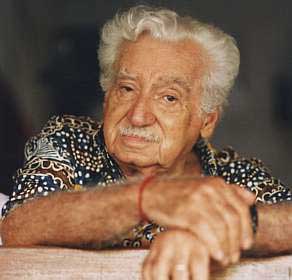Rediscovering Jorge Amado
Jorge Amado (August/10/1912 – August/6/2001) is one of the most famous and translated Brazilian authors of all time. In Brazil many of his books are part of the reading curriculum from middle school all the way through college.
He was born in Itabuna, Bahia and moved to Rio de Janeiro in the thirties to study law. At that time the Federal University of Rio de Janeiro was a polarizing center for political debate and art. There, Jorge Amado developed his political ideology. He became a journalist, and a communist.
As a professional writer he focused on social injustices; his country’s folklore and politics; and the Brazilian people beliefs, traditions and sensuality. His works are amongst the most relevant in the modern Brazilian fiction, with 49 books all inspired by his national roots.
In 1945 he was elected a congressman for the Communist Party, and despite political pressures he authored the bill that guarantees religious freedom in Brazil. He became sensitive to the matter after testifying the persecution of African cults brought with the slaves from their continent, and seeing Protestants being robed by fanatics carrying crosses in Ceará. He worked hard to get his bill turned into law. He’s also authored the Brazilian copyrights bill. Because of his political views he lived in exile in Argentina and Uruguay (1941 – 1942), in Paris (1948 – 1950), and in Prague (1951 – 1952).
Despite calling himself a materialist he practiced Candomblé, a very popular African cult in Brazil favored by the inhabitants of Bahia, his home state.
Since 2008 the Brazilian publishing company, Companhia das Letras, part of the Penguin Group, has been reediting Jorge Amado’s works from his original manuscripts with the support of respected Brazilian intellectuals and writers.
I came to Brazil on vacation and was delighted to find Jorge Amado new editions easily available, as well as many events related to the 100th anniversary of his birth. I decided to reread his books starting with “Gabriela, Clove and Cinnamon” a story of romance and politics in Ilhéus, land of his childhood and inspiration for many of his novels.
As a teenager I remember feeling quite impressed with the sensuality of the main character, now I’m more enthralled by the richness of interesting secondary characters, the setting, and the politics in the story. Jorge Amado is that rare writer that gets even more delighting to read as the years go by.
“In Europe, they call me master, but only walking through the streets of Salvador I feel at ease.” Jorge Amado


1 Comment
I am very happy to find you. I haven’t read anything of Jorge Amado till now but heard or him from a friend.
I let you know soon. But thanks.